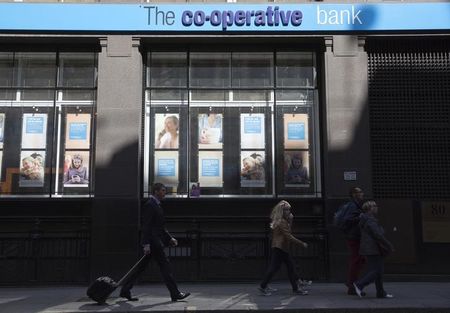By Matt Scuffham
LONDON (Reuters) - Britain's Co-operative Bank said it lost around 38,000 customers in the first half of 2014, following its near collapse last year and a drugs scandal involving former chairman Paul Flowers.
Chief Executive Niall Booker told reporters he regarded the loss of any customer as a "mortal wound" but argued the numbers leaving were not as bad as might have been expected, given the negative publicity that has hounded the bank.
"When you consider what the bank has gone through I don't think it's a bad outcome, but I certainly don't want to appear, or nor am I, complacent about it," Booker said.
The customer loss was revealed on Friday after the bank reported a narrower loss for the first six months of 2014, after axing jobs and closing branches following a restructuring that led to it falling under the control of bondholders.
The bank was left fighting for its survival after a 1.5 billion pound capital shortfall was exposed in June last year following a failed bid to buy hundreds of branches from Lloyds Banking Group.
It was rescued when bondholders including U.S. hedge funds agreed to a recapitalisation which meant Co-op Group went from outright owner to holding just a 20 percent stake.
The bank's problems were exacerbated when former chairman Flowers pleaded guilty to drug possession following a stream of lurid headlines in British tabloid newspapers.
The negative publicity likely resulted in some customers becoming disillusioned with the bank, which had built its reputation around ethical credentials such as not investing in weapons, tobacco and alcohol manufacturers.
Despite that, Co-op Bank said it had attracted nearly 10,000 new customers during the period, leaving it with a net loss of 28,199 current or checking account holders, equivalent to nearly 2 percent of the total.
Britons are often reluctant to move between banks because of the perceived difficulties involved, although new rules that guarantee the paperwork will be completed within seven working days have lifted the number switching.
FINANCIAL STRENGTH
Britain's seventh-biggest lender reported a pretax loss of 75.8 million pounds compared with a loss of 844.6 million in the same period the previous year.
Co-op Bank also said its core Tier 1 capital ratio, a key measure of financial strength, stood at 11.5 percent at the end of June and was expected to be significantly above the previous guidance of 10 percent at the end of 2014.
The bank raised an additional 400 million from investors in May after its Tier 1 ratio slipped to 7.2 percent, dangerously close to the 7 percent absolute minimum required by Britain's financial regulator.
The bank said it had cut staff numbers by 21 percent - or about 1,560 workers - in the past year as it looks to slash costs and Booker said there were more job losses to come.
"A large proportion of our cost is in people and, consequently, we will continue to see job reductions. There have been one or two redundancy programmes and I believe there will be one or two more in that respect," he said.
The bank closed 46 branches, reducing its branch network by 16 percent since the start of the year. Another 25 will close in the remainder of the year, it said.
An independent review commissioned by the bank, published in April, concluded that the root of the bank's problems lay in its 2009 takeover of the Britannia Building Society and poor management controls.
Booker, who is leading a new management team, said the bank doesn't expect to make a profit until 2016 at the earliest.

(Additional reporting by Sarah Young; Editing by Tom Pfeiffer and David Holmes)
